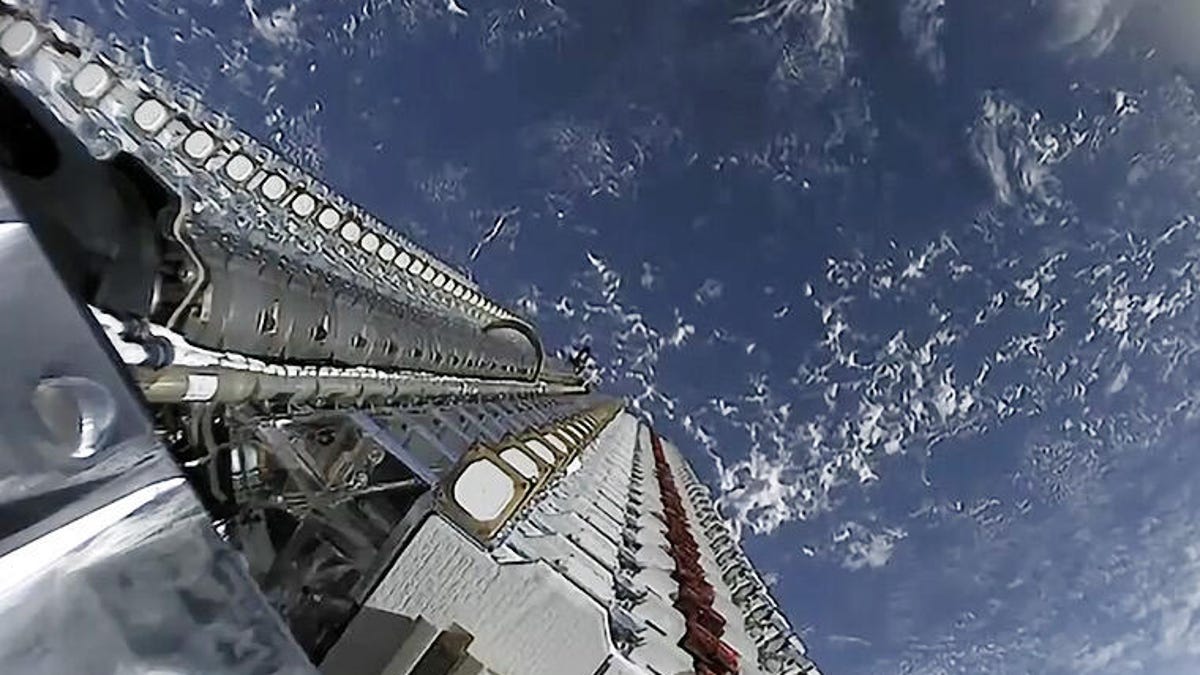 Why You Can Trust CNET
Why You Can Trust CNET SpaceX a handful of Starlink launches from blanketing Earth in broadband
The service is expanding quickly, SpaceX President Gwynne Shotwell says.

A batch of 60 Starlink satellites being deployed.
In the next few months, SpaceX could have more than 1,600 of its Starlink satellites in low-Earth orbit, and that may be enough for the nascent broadband service to reach just about anywhere in the world.
"After about 28 launches, we'll have continuous coverage throughout the globe," SpaceX President Gwynne Shotwell said Tuesday during an online panel discussion for the Satellite 2021 LEO Digital Forum.
The 23rd operational Starlink launch is set for Wednesday. That means we're about a half dozen launches away from the point Shotwell describes. SpaceX has already successfully conducted seven dedicated Starlink launches in 2021 so far (along with 10 more of the satellites on the Transporter-1 rideshare).
Locating local internet providers
The pace of launches looks to be slower in April, but the company should easily reach 28 launches in a matter of months.
That would seem to be a more optimistic timeline than what founder Elon Musk predicted in February, when he said the aim was coverage for "most of Earth by end of year, all by next year."
Locating local internet providers
Most of Earth by end of year, all by next year, then it’s about densifying coverage.
— Elon Musk (@elonmusk) February 22, 2021
Important to note that cellular will always have the advantage in dense urban areas.
Satellites are best for low to medium population density areas.
Shotwell added that once SpaceX has enough Starlink satellites in low-Earth orbit to reach anywhere on the planet, future launches become about adding satellites to increase the capacity of the network. She also made the bold prediction that Starlink will be able to serve every rural household in the United States within three to five years.
Starlink has been in a beta test since October, steadily expanding to more countries and regions around the world.
Shotwell didn't reveal any specifics about how long the trial period will last, saying the company is currently working to increase reliability and reduce connectivity drop-outs. She said Starlink will move out of beta "when we have a really great product that we are proud of."
Shotwell also said SpaceX has no plans for tiered pricing for Starlink. She did not say if the beta test rate of $99 per month (£72, AU$129) will remain, but did note that the cost of the terminal is expected to come down substantially over the next couple of years.
SpaceX has said it costs the company about $1,500 (roughly £1,085, AU$1,958) to make each user terminal, but beta testers are only asked to pay $499 (£360, AU$652). Shotwell says that cost should come all the way down to just a few hundred dollars per terminal, which could significantly reduce the upfront investment to sign up for the service.
Follow CNET's 2021 Space Calendar to stay up to date with all the latest space news this year. You can even add it to your own Google Calendar.

